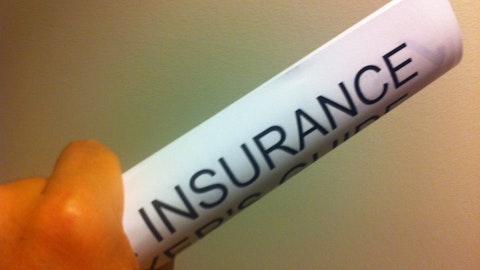Ryan Tunis: And then, I guess, just bigger picture with commercial auto. It seems like it’s been like almost an impossible line to underwrite over the past decade. Just curious like for a business like Berkley. Why does that line need to be such a large component of what you underwrite? Is it that it’s bundled with other stuff? Or you think you can ultimately get it right? I’m just curious why structurally that has to be such a large part of your mix?
Rob Berkley: Yes. So I think we need to dissect that a little bit. And apologies in advance if this proves to be more of an answer than you’re looking for. But as far as commercial auto goes, I would draw the analogy perhaps to your point that it’s sort of the industry’s version of whack-a-mole. As far as our book goes, we write it both stand-alone and we also write it as part of a package. Is it relevant to how you write a package? Yes, it is. But that doesn’t mean you should write it in an undisciplined manner. I think as far as the Monoline goes, we play when we think we’re making a buck and quite frankly, a lot of our Monoline guys, we think, over the past few years have done very well. So we’ll see over time, but I think we just have some reservation and concerns about where the marketplace is going.
That having been said, it has caused us indigestion from time-to-time. I think we’ve as of late, have more consistently done better where we’re running at Monoline because we are very focused on it. I think there are some examples where we’ve written as part of a package where we probably haven’t been as focused and didn’t have is strong and expertise being brought to bear, and that is something that we are working at changing. But yes, are there moments in time where I look at it and I say, how does this make sense? That having been said, there are many parts of this organization where they are doing it consistently well.
Ryan Tunis: Thanks, Rob.
Rob Berkley: Thanks for the question.
Operator: We’ll take our next question from Brian Meredith with UBS.
Rob Berkley: Hey, Brian. Good afternoon.
Brian Meredith: Good afternoon to you. Rob, just curious, any green shoots at all in the professional liability line and maybe even related to cyber, and we’ve seen some big losses come through in the cyber area of late. And is that causing any kind of upward pressure on rates and maybe some opportunity around that line?
Rob Berkley: I guess my answer would be not yet. We’ll have to see what comes about. Particularly as far as cyber goes, it’s going to be interesting to see what type of pressure the reinsurance marketplace brings to bear on the underlying or the insurance marketplace. As far as D&O goes, it continues to be very, very competitive. Other parts of professional liability, I would tell you that to a varying degree, it’s pretty challenging out here. So again, I think that you can still make a buck in a bunch of pockets, but you need to be careful.
Brian Meredith: Got you. Makes sense. And then, Rob, just remind me that, that business going through the python. Is it anything impact on your underlying or your loss picks? So you just having to set a little more conservative? Is that book earn kind of runs off here?
Rob Berkley: The answer is as we saw what was going on with it. We pushed the picks up. We think what we’re carrying makes sense and it won’t be an issue but quite honestly, we wish them well, but we’re not going to miss them.
Brian Meredith: Great. Thanks.
Operator: We’ll take our next question from Meyer Shields with KBW.
Rob Berkley: Hey, Meyer. Good afternoon.
Meyer Shields: Hi, good afternoon. How are you?
Rob Berkley: Good. How are you.
Meyer Shields: Good, thank you. I wanted to drill down a little bit more maybe into feeding commissions on casualty reinsurance, because we’re reading a lot if you said, maybe European reinsurers getting nervous about social inflation. I’m wondering, is it too early or are in your current discussion, so let’s say, one-one casualty reinsurance renewals. Is there — are there any indications of seeding commissions improve it?
Rob Berkley: They don’t invite me to their pricing meetings, so I don’t know. That hasn’t been — given the chatter, I think they’re thinking about it. But we’ll have to see whether the dialogue and the commentary materializes in action.
Meyer Shields: Fair enough I wanted to step back a you talked about Berkley’s willingness to write more property in the current environment. And I’m wondering about now that we’re nine months through the year, how the growth that you’ve seen compares with the expectations you had and the opportunity you saw as you go back to December of last year?
Rob Berkley: I think that we feel quite good about what has been accomplished by our colleagues and I understand that many of you, the only barometer you have is how much premium that we are writing. But what may not always come through as clearly is maybe we’re collecting the same amount of premium but we’ve reduced the exposure by one-third or maybe we’re collecting 30% more premium, but we’ve reduced the exposure considerably. So it’s not just a matter of how much you write. It’s a matter of how much you’re going to make, obviously. And I think our colleagues both domestically as well as outside of the U.S. have done a nice job navigating the channel and continue to.
Meyer Shields: Okay, fantastic. Thank you very much.
Rob Berkley: Thanks for the question.
Operator: Our next question comes from Mark Hughes with Truist.
Mark Hughes: Yes, thanks. I just wanted to ask about the — hello again, I want to ask about the expense ratio, particularly in the reinsurance segment, it was pretty low this quarter. Just any general thoughts about expense ratio overall.
Rob Berkley: Look, I think the — as we’ve suggested to people in the past, our view is that we’re going to be able to keep the expense ratio more likely than not comfortably below $30. That can obviously be impacted as you’re familiar, Mark and others are as well. Our oftentimes prefer an approach for growth is through de novo or starting new businesses. When you start a new business and it’s in its infancy and doesn’t have scale, not a lot of earned premium that has a negative impact on your expense ratio. That having been said, we think it’s a much more controlled model to growing the business. So again, does it pick up a little bit, it can go up, it can go down. But probably the biggest driver around that is businesses that we start and the timing for them to get to scale. But I think we remain convinced that we should be able to keep it starting with a two.




